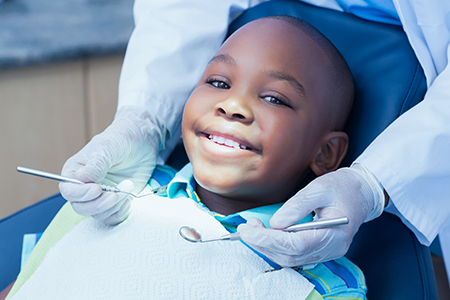
At the office of Caring Bear Dental, the health and growth of your child's smile is a priority we take very seriously. Our approach balances prevention, education, and gentle clinical care so children learn to value their oral health and feel comfortable at each visit. We help families establish routines that protect developing teeth and support healthy habits that last a lifetime.

Introducing a child to the dentist should feel like the beginning of a partnership. Early pediatric dental exams focus on familiarizing young patients with the environment and teaching caregivers how to care for tiny teeth and gums. These visits are brief, friendly, and tailored to the child’s age so each experience is positive and confidence-building.
During the first exams, clinicians assess oral tissues, check for early signs of decay, and discuss feeding and pacifier use with caregivers. Practical guidance—such as how to wipe an infant's gums, when to introduce a toothbrush, and the appropriate amount of toothpaste—helps families form consistent routines that protect teeth as they erupt.
Prevention is the core objective of early visits. Small interventions like topical fluoride applications or anticipatory counseling about diet and oral habits can significantly reduce the chance of future problems. By establishing regular checkups early, families benefit from ongoing monitoring and timely advice as children grow.

Every routine pediatric exam combines a clinical assessment with preventive care. The dentist or hygienist will review your child’s medical and dental history, examine the teeth and soft tissues, and evaluate how the jaws and bite are developing. These observations guide practical recommendations tailored to your child’s needs.
Because many issues form below the surface, digital radiographs are taken only when necessary to check for cavities between teeth or to review the position of developing permanent teeth. This selective use of imaging helps clinicians detect problems early without unnecessary exposure.
A professional cleaning removes plaque and debris, and provides a chance to teach age-appropriate brushing and flossing techniques. Caregivers receive clear, actionable tips for home care and nutrition so that every exam reinforces healthy habits rather than merely documenting findings.
Tooth decay remains one of the most common conditions affecting children, but it is largely preventable. Decay develops when plaque, frequent sugar exposure, and insufficient oral hygiene create an environment in which bacteria can damage enamel. Identifying risk factors early allows clinicians and families to reduce those risks together.
Preventive measures include routine cleanings, targeted fluoride varnish when appropriate, and the use of dental sealants on permanent molars once they erupt. Equally important are conversations about feeding practices—such as avoiding putting a child to bed with a bottle of sugary liquid—and encouraging water between meals.
Our team emphasizes practical strategies to make oral care manageable: simple morning and bedtime routines, creative ways to engage children with brushing, and snack ideas that protect teeth while supporting overall nutrition. These small changes add up to fewer cavities and healthier smiles.
Start regular dental visits early to establish comfort and continuity of care
Clean baby teeth and gums gently from the first eruption with age-appropriate tools
Avoid allowing bottles of milk or juice at bedtime; favor water if a comfort object is needed
Bring your child in for routine exams and cleanings on a schedule recommended by your clinician
Model and reinforce brushing and flossing as part of daily family routines
Choose nutritious snacks and limit frequent sugary drinks between meals
Help your child discontinue prolonged pacifier use or thumb sucking at the right developmental stage
Make sure your child wears a mouthguard when participating in contact sports to protect teeth and soft tissues

Tooth development begins long before eruption, and many parents are surprised by how early milestones occur. Primary teeth typically start to appear around six months of age, and the first year is a crucial window for establishing care routines and monitoring early growth.
At well-baby dental visits, clinicians provide guidance on teething comfort measures, safe oral hygiene techniques for infants, and strategies to minimize the risk of early tooth decay. These visits also offer reassurance and clear answers to common concerns, such as drooling, disrupted sleep, and dietary transitions.
Understanding the role of baby teeth is important: they support eating, speech development, and act as placeholders for permanent teeth. Protecting them through early prevention helps avoid complications that can affect long-term dental health and alignment.
As children grow, dental exams shift from simply checking for cavities to monitoring facial and jaw development. Subtle signs—like crossbites, significant crowding, or asymmetrical jaw growth—can emerge early and, when identified promptly, are easier to address.
An early orthodontic screening does not always mean immediate treatment; rather, it informs timing and strategy. Some interventions are most effective during periods of growth, so regular dental exams function as an ongoing assessment to determine if or when a specialist’s input is warranted.
Our team coordinates care with orthodontic colleagues when appropriate, focusing on minimally invasive approaches that guide development and preserve healthy function. Families receive practical guidance to protect appliances and maintain oral hygiene when braces or other devices are in place.
Active children sometimes experience dental injuries or sudden tooth pain. Pediatric dental exams also prepare families with information on how to respond to common emergencies—such as a knocked-out tooth, a fractured tooth, or severe toothache—so that caregivers can act quickly and calmly when necessary.
Prompt professional attention can often preserve tooth structure and reduce complications. During routine exams we review emergency steps and prevention strategies—like proper mouthguard use and safe play practices—which reduce risk and help parents feel prepared.
When urgent needs arise, the team will prioritize swift, age-appropriate care designed to relieve discomfort and prevent further damage while maintaining a child-focused, compassionate approach.
Every pediatric exam includes clear, actionable recommendations families can follow at home. Topics commonly covered are brushing and flossing technique by age, timing for fluoride and sealants, guidance on pacifier and thumb-sucking cessation, and tips for managing sports safety and nutrition to protect teeth.
We focus on realistic, sustainable habits that fit into busy family lives so oral care becomes a natural part of daily routines. Small improvements—consistency with twice-daily brushing, limiting sugary snacks, and wearing a mouthguard during sports—have outsized benefits over time.
Caregivers leave exams equipped with targeted steps and a plan for follow-up visits so progress can be tracked and adjustments made as children grow.
In summary, regular pediatric dental exams give families the tools and professional oversight needed to keep children's smiles healthy as they grow. The practice emphasizes gentle prevention, timely intervention, and clear guidance that makes oral care manageable and effective. Please contact us for more information or to discuss your child’s dental needs.
A pedodontist is a dentist who has received advanced specialty training in meeting the dental needs of children from infancy to adolescence. Pedodontists, also referred to as "pediatric dentists," study child psychology, behavior management, caring for children with special needs, methods of handling oral/facial trauma, and various techniques for providing anesthesia and sedation. Pedodontists also understand the complexities of facial growth and development and have the clinical skills required to meet the dental needs of all children at every stage of development. Most of all, pedodontists are passionate about what they do and enjoy working with children. They strive to make every dental experience a positive one as they help children establish a strong foundation for good oral health.
Even before your child is born, their first set of teeth is already forming. In fact, by one year of age, some of your baby's front teeth will have already come into place. While the arrival of your baby's first teeth is only one of many developmental milestones, it represents an excellent time to begin a program of oral care. According to recommendations from the American Dental Association, babies should see the dentist around the time of their first birthdays.
Your baby's first teeth typically begin to appear in the 6 to 12-month range. While this is an extraordinary milestone, you need to be aware that your baby may find the experience a little bit uncomfortable. Teething can make babies feel irritable. They may be fussy, have trouble sleeping, not want to eat, and drool quite a bit.
Although you are powerless to speed up the process of teething, there are a few things that you can do to soothe your baby as the new teeth are erupting into place. Common approaches to helping your baby feel more comfortable while getting new teeth, include teething rings or a cold spoon or moist gauze rubbed over their gums.
Even for these few new teeth, it's absolutely essential to establish an effective regimen of oral care. For information on when your baby's first set of teeth will erupt into place, consult this timeline from the American Dental Association: Eruption Charts
Some children persist in sucking their thumbs or fingers beyond their preschool years. For these children, the activity continues to be a source of comfort, relaxation, and security. It may even help them fall asleep at night. However, it's essential to be aware that in the long-term, a finger sucking habit is not healthy.
If your child's thumb or finger sucking habit is still present when the permanent teeth begin to come in, your child is at a higher risk of developing a bad bite. By the age of five or six years, you need to constructively and gently help your child stop the habit.
It's also a good idea to have a comprehensive evaluation at this time. Your pedodontist can assess if there are any habit related alterations to the alignment of your child's teeth or jaws, or if it is affecting their speech or swallowing patterns. They can also discuss habit control strategies with you, as well as follow your child's bite and facial development as they grow. If interceptive appliances or corrective orthodontic care are recommended, the timetable and best options in care will be explained in complete detail.
